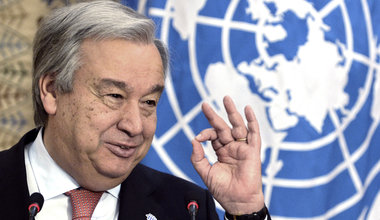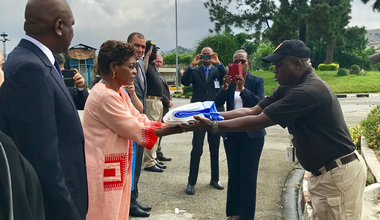Interview with SRSG Y.J. Choi on UN Radio in New York on 20 January 2009
Abidjan, 21 January 2009 ...The Special Representative of the UN Secretary-General for Cote d'Ivoire, Y.J. Choi, who is in New York for the renewal of the mandate of the United Nations Operation in Côte d'Ivoire (UNOCI), spoke to UN Radio about the Mission's role in the peace process and his hopes for the holding of peaceful elections in the coming months.
UN Radio: I would like to know where the peace process in Cote d'Ivoire is today. It seems as if it's taking really long to normalize the situation.
SRSG Choi: As you say the progress is slow, there is no denying it but it is very solid. We have three objectives in Côte d'Ivoire: identification of the population, disarmament and elections. The first step which is identification works remarkably well, even though slowly. As we speak right now we have 3.5 million people identified, this is more than half way to the objective which is between 6 to 7 million people identified, without a single major incident. Who would have imagined one year ago that we would arrive to where we are in terms of identification. So if things move as they are today, we will have identification completed in several weeks. This is a remarkable achievement for the history of Cote d'Ivoire, so slowly but solidly there is a progress.
UN Radio: When you say identification, you mean identifying people who qualify to be Ivoirian?
SRSG Choi: Yes, because as you know Côte d'Ivoire was a very rich country agriculturally for several decades. So from neighbouring countries there was an influx of agricultural immigration to Côte d'Ivoire. As the economy went down there was a division between original Ivorians and those who came later. This is what they called Ivorite and this brought about incredible pain to the population and incredible disturbance in Ivorian politics for about 20 years. Now, thanks to the wisdom of all the Ivorian protagonists, with the cooperation of the international community, this question will be resolved once and for all in several weeks. Isn't it remarkable for Côte D'Ivoire, there will be no question of Ivorite, who will be excluded, who will be included, everybody will be included in the process
UN Radio: In this process are there people who are identified as not belonging to Côte d'Ivoire in this identification process?
SRSG Choi: No, you simply need to prove that you are Ivorian, you will get your national identity card in several weeks. So the process has become very simple, thanks to the historic decision by the Ivorian politicians. So I commend them for their courage and wisdom.
UN Radio: Now let us talk about the demobilization and reintegration of former combatants, what is happening on that front?
SRSG Choi: We have to introduce the event which happened 22 December last year, what we call the fourth supplementary agreement of Ouagadougou was signed. This will reverse the order. Before Ouaga Four, elections should have happened before disarmament. Now they have changed the order. They want to see disarmament completed two months before the elections. So the interpretation is that this will make the electoral process heavier than before but there is also chance that because of this constraint, people will work more diligently to see disarmament before this election, which is a remarkable thing if it happens. So we will be helping them realize disarmament before the elections.
UN Radio: So how far have you gone? Have all the former combatants been disarmed?
SRSG Choi: One important thing is if you compare Côte d'Ivoire with the DRC, there is a rebel group which does not recognize the peace process, a very strong army, as I hear, a more than 20,000-strong army. In Côte d'Ivoire everybody is on board. It is a very good sign. The ex-rebel leader is the Prime Minister and his colleagues are now ministers and the general of the FAFN, which is the ex-rebel army, he is almost daily in contact with our commander and with the government's force commander. So we have excellent rapport, everybody is on board and it is a very good sign.
UN Radio: So everybody has been reintegrated into the army?
SRSG Choi: Not in the army but politically everybody accepts the electoral process and the identification process. Disarmament itself and reintegration of the army into one army is a big question discussed within the framework of Ouaga Four. The concept now is they will have three elements in it: the army 5,000, police and gendarmerie 4,000 and the rest of the ex-combatants will receive 1,000 dollars each as compensation. They will go back to their villages. It is a very simple scheme. I hope it works and there is progress now in terms of re-establishment of state authority in the north, which must be completed by 2 February 2009. The progress is there, so we hope we will soon realize this important objective.
UN Radio: And what has happened to the zone of confidence which divided the north and the south?
SRSG Choi: That is an important question I thank you for that. There are ten zones. There is a commander for each zone and there are ten of them. With the Ouaga 3 they will all disappear. The zones will disappear and the commanders will keep there rank but they will no longer exercise administrative authority. They will hand over to the prefects, the governors and they will be only in camps, which will allow the cantonment of up to 5,000 military, the soldiers. There will be no zones any longer.
UN Radio: Let's talk about the much-awaited elections, when can one expect those to be held?
SRSG Choi: Previously it was planned to take place 30th of November 2008. Now it is over, we cannot do it and now people want to have identification first, which I think by Spring 2009 we can resolve the identification process to the end. Then we will envisage the electoral process which will usually take, according to the experts, four to five months, which will include five steps non-collapsible. So this gives you a time frame. But the most important thing is we have to complete identification first which I think is a wise action on their part.
UN Radio: What role is the United Nations playing to speed up this process?
SRSG Choi: The Ouagadougou Political Agreement, by virtue of this agreement we gave the ownership to the Ivorians. So they plan the elections but they need our presence for many things. First, providing the peace to the electoral process. We have over 8,000 in the army and 1,000 civilian police and they provide a peaceful framework for the whole electoral process. Secondly I have the certification mandate. This is the third time in UN history. We had one in East Timor, Nepal, and now we have here. With these tools we should not allow the scenario which regrettably took place in Kenya or Zimbabwe. There will be no such scenario in Côte d'Ivoire. So whoever wins the election will win the election. That is our mandate and I will make sure it happens.
UN Radio: How can you guarantee that?
SRSG Choi: With all my resources, we have 11,000 people in Cote d'Ivoire. We have a 500,000 million budget a year. We also have the determination with the co-operation of Ivorians and I fortunately share my idea with five criteria frame for identification. There is peace, inclusiveness, state media, electoral list and the result. They all accepted it but, as they say, the devil is in the detail but the fact that they accept the five criteria is an excellent sign and I feel confident given the refined political culture of Ivorians. I think I can make it happen.
UN Radio: Do you have any idea how many parties can be expected to participate in this election?
SRSG Choi: There will be, they say, more than 15 candidates but people know that there will be three major candidates: President Gbagbo the current president, ex-president Bedie and ex- Prime Minister Ouatara. The three major candidates. They are members of what we call CPC, the Standing Consultative Framework which meets in Ouagadougou. The other two members are Prime Minister Soro and President Campaore of Burkina Faso. So by virtue of this, being member of the CPC, they stand out among the other candidates.
UN Radio: What's happening on the economic front? Is Côte d'Ivoire making progress to make sure that the economy is there to deliver to the people?
SRSG Choi: In current term, Côte d'Ivoire is not a failed state. There is a government which provides the basic needs for people, much better than many other neighbouring countries, like water and electricity. This is better supplied than any other neighbouring cities. There is a government with a robust budget and there is an army, gendarmerie and police. The total is more than 20,000 people, so the government is paying the security force. So the economy is good, but long term-wise, there are preoccupations like very high rates of youth unemployment, the problem of maintaining the price of the basic commodities but short term-wise, we are confident that once election, identification and disarmament are over, we can entertain an exit strategy much better than any other peace keeping mission.
UN Radio: Is there any other cooperation with other missions in the region like UNMIL, the UN Mission in Liberia?
SRSG Choi: That's a valid question. We are already making contact with UNMIL because we share a common border, Liberia and Côte d'Ivoire. As election approaches, elections usually generate passion, emotion among the people, especially youth. So, to increase our capacity of dissuasion, we are talking with Liberia to borrow some of their resources, as well as their troops during the electoral period.
UN Radio: So UNMIL will loan you some of its resources?
SRSG Choi: Exactly. We have already a mandate from the Security Council. It is within our mandate. The two missions are cooperating very well.
UN Radio: Mentioning the Security Council, it is meeting this week, I understand. What is it discussing?
SRSG Choi: First, there will be renewal of the mandate for six months, I hope. Also we will be discussing the reduction of one battalion in Côte d'Ivoire without changing our mandate. This is very rare in peacekeeping history. We proposed voluntarily on our own initiative reduction of one battalion that is between seven to eight hundred troops before the elections. This is possible because peace has largely been restored in Côte d'Ivoire, thanks to the Ouagadougou Political Agreement.
UN Radio: From what you are saying it seems the situation there is irreversible.
SRSG Choi: I am convinced that the electoral process has become irreversible. We will get there slowly, but we will get there.
UN Radio: O.K. I wish you all the best and thank you for giving us this interview again.
SRSG Choi: Thank you.
 UN
UN United Nations Peacekeeping
United Nations Peacekeeping



